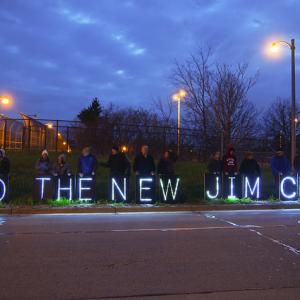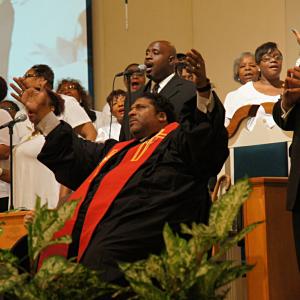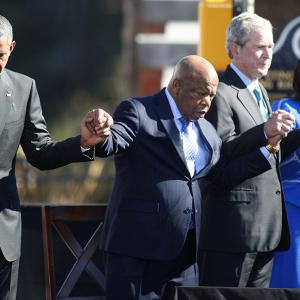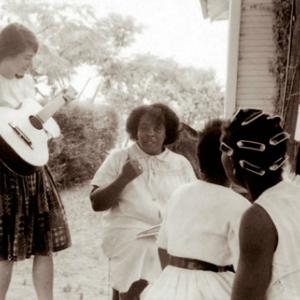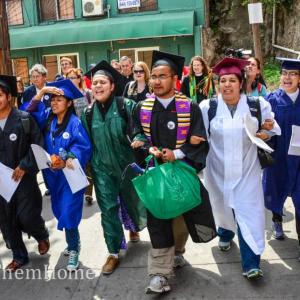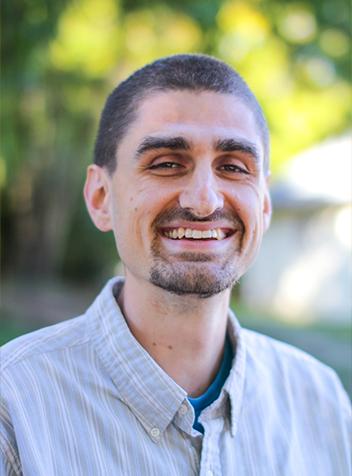
Jonathan Wilson-Hartgrove is assistant director for partnerships at the Yale Center for Public Theology and Public Policy. A preacher, author, and community cultivator, he is a member of the national steering committee of The Poor People’s Campaign: A National Call for Moral Revival. He is the author, most recently, of White Poverty: How Exposing Myths About Race and Class Can Reconstruct American Democracy with William J. Barber II.
Posts By This Author
The Second Career of James Crow, Esq.
Our lawyers have made a strong case this week that the voter ID component of this legislation places an unnecessary and undue burden on voters — especially poor and African-American voters. We will ultimately win this fight in the courts. But this case is about much more than defeating voter ID laws. It is about a central question of 21st-century American politics: is a multiethnic democracy possible?
A Politics Beyond Fear
The Value of Fusion Friendships
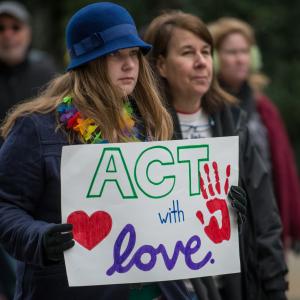
Moral Mondays March in Raleigh, N.C. on Feb. 8, 2014. EPG_EuroPhotoGraphics / Shutterstock.com
Since the Republican presidential front-runner announced after San Bernardino that he would close America’s borders to Muslims, a debate has ensued about what “radicalization” means and how far we as a nation are willing to go to protect ourselves from it. So-called liberals (and even some in the Republican party’s mainstream) have said, “Not all Muslims have been radicalized.” To this Donald Trump retorts, “Until we know which ones have been, let’s keep them all out.” The unquestioned consensus in America’s public square is that we can only be safe by figuring out who the un-American terrorists are and getting rid of them.
But where we're from in North Carolina, we should not be so naïve. We have a disproportionate share of homegrown terrorists.
Twelve Years for a Paintbrush
We can't understand race today without understanding prisons.
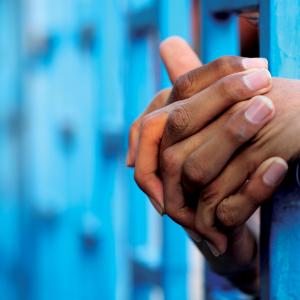
Sakhorn / Shutterstock
EARLY ONE SUNDAY MORNING, I drive to the Durham Correctional Center to pick up Greg. He’s spent the past 16 months at a state prison down east, working overtime in the kitchen so he could get out six weeks early. A few days ago, the Department of Corrections transferred him to this local minimum-security facility. Greg knows the place well. He’s walked out of here more times than he can count.
“Feel good to be out?” I ask as we walk through the gate of the chain-link fence, nodding goodbye to the guards. “You know it does,” Greg says, his back straight and his eyes fixed on the horizon. He’s relishing this taste of freedom.
But Greg knows this pleasure is fleeting. As good as it might feel to walk through the gate and hop in a car, leaving prison doesn’t mean you get to leave this part of your life behind.
According to the Prison Policy Initiative, more than 2.4 million Americans are locked behind bars (and 12 million cycle through local jails each year). At any given time, some 6 million Americans are caught up in the criminal justice system—if not behind bars, then checking in with a parole officer who can carry them back to jail for the smallest of transgressions. Like Greg, a disproportionate number of those impacted by the U.S. criminal justice system are African American.
Even if you walk out of the gate like Greg, time served, you still have to deal with the debts that ruined your credit while you were locked away. You still have to rebuild relationships that were cut off because you spent the past decade behind bars. You still have to check the box on almost every job application that says you’re a convicted felon.
I live in a home named Rutba House, where we have opened our doors to friends like Greg who are coming home from prison. Doing so has helped me see that our country’s original sin of race-based slavery has shifted its shape again in the 21st century. As the Black Lives Matter movement has tried to make clear on America’s streets, race still matters. But in light of the fact that African Americans are incarcerated at nearly six times the rate of whites, we cannot understand race in America today without understanding prisons.
Will Evangelicals Welcome Pope Francis? The Good News Depends on It
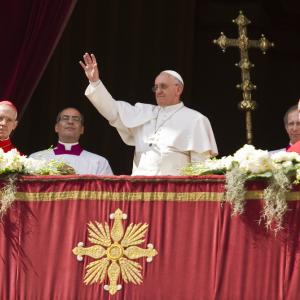
Pope Francis on Easter Sunday 2013 in St. Peter's Square at the Vatican. Photo via Philip Chidell / Shutterstock.com
As evangelical preachers in the American South, we’re excited to welcome our brother, Pope Francis, to the U.S.
We want to be explicit in our evangelical welcome because so many who claim to be evangelical are criticizing the pope for being political and not preaching orthodox theology.
The Voting Rights Act’s Jubilee: A Necessary Interruption
NC NAACP vs. McCrory is a necessary interruption to the institutionalized racism that is killing black and brown people. For all the talk around “black lives matter,” Rev. Barber warns, we are in danger of only affirming that black death matters if we accept that the martyrs of Charleston deserve nothing more than the removal of a Confederate flag from their state house. Yes, the flags should come down. But if they go away while the unjust laws remain, then it may be even harder for us to see that the root of injustice is in an imbalance of power.
And the fundamental power of citizenship in this country is still the franchise.
Born Suspect
This isn't a story about the death penalty. It's about life interrupted, making a new world possible.
ON A COOL NIGHT in spring 2006, I knelt with a half-dozen friends on the driveway of North Carolina’s maximum-security prison. When officers came to inform us we were trespassing, we asked if they would join us in prayer against the scheduled execution of Willie Brown. Though one officer thanked us for doing what he could not, we were arrested and carried off to the county jail. Willie Brown died early the next morning.
But this isn’t an article about the death penalty.
At the county jail that evening nearly a decade ago, I was fingerprinted, strip-searched, dressed in an orange jumpsuit, and processed into the general population of an overcrowded cell block. When I walked onto the block, I was greeted almost immediately by a 20-something African-American man who asked me, “What the hell are you doing here?” As I summarized the events of the previous evening that had led to my arrest, he decided I was teachable. “You wanna know how I knew you weren’t supposed to be here?” he asked. “’Cause everybody else in here I knew before they got here. We’re all from the same hood.”
“They only kill people like us,” my teacher at the county jail told me that day. “The train that ends at death row starts here.”
The Long History of Sexual Baiting in America’s Effort to Extend Civil Rights
From Ava DuVernay’s award-winning film to President Obama’s speech at the Edmund Pettus Bridge, America has remembered Selma this year. We have honored grass-roots leaders, acknowledged the sacrifices of civil rights workers and celebrated the great achievement of the Voting Rights Act. At the same time, we have recalled the hatred and fear of white supremacy in 1960s Alabama. But we may not have looked closely enough at this ugly history.
Even as we celebrate one of America’s great strides toward freedom, the ugliest ghosts of our past haunt us in today’s “religious freedom” laws.
Many able commentators have pointed out the problem of laws that purport to protect a First Amendment right to religious freedom by creating an opportunity to violate other people’s 14th Amendment right to equal protection under the law. But little attention has been paid to the struggle from which the 14th Amendment was born — a struggle that played out in Selma 50 years ago and is very much alive in America’s statehouses today.
We cannot understand the new religious freedom law in Indiana and others like it apart from the highly sexualized backlash against America’s first two Reconstructions.
Freedom Summer Volunteers Inspired by More than Just Idealism
On June 2, 1964, while hundreds of Freedom Summer volunteers were still finishing their training in Oxford, Ohio, three civil rights workers went missing in Neshoba County, Miss.
Moses knew from his experience in Mississippi that James Chaney, Michael Schwerner, and Andrew Goodman, who had left the day before to investigate a church burning in Philadelphia, Miss., would never be found alive. Moses’ responsibility that evening was to tell the young recruits who planned to spend their summer registering voters in Mississippi that they could meet the same end.
What happened next surprised some. In small circles, the young volunteers sat and talked. Soon, they started singing.
Botched Oklahoma Execution Reveals Self-Deception
At 6:23 p.m. yesterday, the state of Oklahoma initiated its effort to kill Clayton D. Lockett. Twenty minutes later, after being declared unconscious by a physician, Lockett cried out, "Oh, man," writhing in pain. Addled by this unexpected display of pain, one of the executioners said, "Something’s wrong." Soon after, the window to the observation room was covered and media were escorted out of the room.
A state official later reported that Mr. Lockett died of a heart attack at 7:06pm.
The fact that this unexpected scene was preceded by months of arguments by lawyers about the constitutionality of resuming executions in Oklahoma guarantees that a debate about the death penalty will ensue. Those who have argued that this ultimate form of punishment is "cruel and unusual" will make last nights scene their case in point. The Governor of Oklahoma has already declared that a thorough investigation of what went wrong will take place before any other executions go forward. Privately, in conversations at home and on their computers, many will say, "Did he suffer? Sure. But why shouldn’t he after what he did." Most national polls show that support for vs. opposition to the death penalty is about 50/50. Both sides will have plenty of people to argue.
But I think it would be the greatest of tragedies if we did not notice that what happened in Oklahoma last night reveals perhaps our deepest national self-deception — that, no matter what goes wrong, we will fix it because we are in control.
'Forward Together, Not One Step Back!'
A grassroots resistance movement emerges in North Carolina.
THOSE WHO BELIEVE in freedom and work for justice in our world sometimes grow nostalgic about the 1960s in this country, looking back at the leadership that emerged from African-American churches in the South, drawing allies from outside the region and beyond the bounds of creed. America has a vivid, living memory of faith inspiring public justice. But the civil rights movement did not just happen. The March on Washington and Selma were moments in history made possible by movements that grew out of hard work over the course of decades.
This summer in North Carolina, “Moral Mondays” at the state General Assembly have drawn thousands of weekly protesters, more than 800 of whom have been arrested for engaging in mass civil disobedience. A few weeks into the campaign, some elders started saying it felt like the ’60s all over again. The Washington Post highlighted NAACP state chapter president Rev. William Barber’s dynamic preaching. The New York Times pointed to the significance of hundreds of clergy uniting to lead the movement. MSNBC andFox News set up their satellite trucks. Week after week, thousands of people kept coming.
When reporters asked why, participants explained the concerns: 500,000 people denied health care when the legislature refused federal funds for Medicaid expansion, 70,000 people whose unemployment insurance was cut off, thousands of poor families denied an earned income tax credit, wholesale repeal of the hard-won Racial Justice Act, and diversion of public education funds through a voucher program. The reasons were legion, but they were not, by and large, unique to North Carolina. They were the sort of changes the American Legislative Exchange Council (ALEC) promotes at the state level throughout the country. How, then, did this grassroots resistance movement emerge in North Carolina?
The Dream 9: Praying God Will Make a Way
On Monday I watched as my young DREAMer friends pause to pray from the “other side” of the fence in Nogales, Mexico before attempting to cross the border back into the Arizona. Rev. John Fife, founder of the Sanctuary Movement, walked with his hand on the shoulder of Marco Saavedra. As he approached the border, a reporter asked Marco if he had anything to say. “Perfect love casts out all fear,” he said. Then he stepped forward into the unknown.
All nine immigrant youth leaders grew up in the U.S., some of them qualify for Deferred Action for Childhod Arrivals, therefore are DREAMers. They chose to leave the U.S. to accompany their undocumented peers, who also grew up here, but who left or were deported because of a broken immigration system. They and their families are victims of the broken U.S. border policy. So “documented” and “undocumented” youth, standing together for justice, met on the Mexico side of the border an attempted to cross back into the U.S. together. They were immediately arrested by Immigration and Customs Enforcement officials and are now detained at the Correction Corporation of America’s private detention center in Eloy, Ariz.
Stability vs. Mobility
Being rooted in one place is a good thing, but faithfulness doesn't end where the road begins.
Jonathan Wilson-Hartgrove and Isaac S. Villegas are friends and fellow kingdom-bringers in Durham, North Carolina. Since publishing The Wisdom of Stability in 2010, Jonathan has been calling Christians to put down roots and pay attention to place for the sake of God’s reign. Isaac has gently challenged him to recognize the dangers of stability and the way immigrants or marginalized members of a community are often excluded by those who “own their place.” They offer their conversation as an invitation to discern with them a theology of place for our time.
Isaac S. Villegas: I was working alongside a little girl in our congregation’s community garden at the women’s shelter in Chapel Hill. As we were digging, she looked up at me and said that her mom warned her to beware of lice when playing outside. I reassured her that I hadn’t seen any lice around, but I asked her if she knew what to look out for. “Yes,” she said. “My mom told me to watch out for Mexicans because they bring lice.” I looked down at my hands, wondering if my hue revealed that I’m from lands further south than Mexico. Will this child grow up to think that people like me don’t belong in the South, that we are social contaminants, that our cultures dirty the body politic, that we spread lice?
These are the questions that linger in my mind when I hear my friend Jonathan argue for a recovery of “the wisdom of stability” in the Christian community. In this land where both Jonathan and I live, I’m uneasy when I hear “stability” because I see how such rhetoric belongs to a particular Southern tradition. I am the foreigner, of questionable lineage, that the people who’ve been here longer can reject or accept—reject because they think that I’m a threat to the stability of the community, or accept because they think I will contribute to a sustainable future. In either case, the assumption is that they are the ones entrusted with the land and culture. Arguments about stability have fueled people’s claims to own or steward the land and their assumption that they are the gatekeepers of society, deciding who belongs where.
“I hope to reprogram your default setting,” Jonathan writes in his book. “Our default is to move.” Instead of movement, he points to the witness of trees, which serves as the book’s focal image: “Trees can be transplanted ... But their default is to stay.” I worry that to celebrate stability as the solution to movement renders recent immigrants as defective Christians—wild, unruly, in need of reprogramming.
Movement is my default setting: It’s in my immigrant blood; it’s the story of my family. While the wisdom of stability privileges the parts of the Bible that call us to permanency, I find good news in the biblical stories of wandering, exodus, relocation, and mission. These stories resonate with the lives of migrants—people who are not trees, but birds: always building and abandoning nests as they follow the seasons.
Jonathan Wilson-Hartgrove: Every writer needs friends who remind them that words can be dangerous. I’m grateful for Isaac, who keeps me thinking hard about what I’m saying and why.
Shortly after The Wisdom of Stability was published, I got a call from the director of a mission agency who’d read the book. He asked if I’d come and speak to the global gathering of the group’s staff. I’d love to, I told him, but wondered why they thought a word on stability was needed. “Well, we have a problem in missions,” he said. “We keep sending people who’ve never belonged anywhere. They don’t seem to have much capacity to connect with the places where we send them.”
Soul Force vs. The Assassin
Gandhi and the Unspeakable: His Final Experiment with Truth, by James W. Douglass.
An Advent Reflection: Being a Hospitality House

"Away in a manger" at the Holy Cross Monastery, NY. Via Wylio: http://bit.ly/rRaH5G
I think of Mary, the young woman whose eyes were opened to God’s messenger, whose womb was opened to God in human flesh. The Greeks call her theotokos — the God-bearer.
She is the one who welcomed Jesus to make his home in her. Blessed among women, she is a model for us.
She’s not just an inspiration for a house of hospitality. She is one.
Two years ago, Leah was very pregnant during Advent. Because of high blood pressure, she was on bed rest for most of it. So we waited.
We waited for our daughter to come, and we waited for Christmas. We waited with Mary to greet face-to-face the One whom we invite into our lives every time we whisper a prayer.
Waiting, we learned, changes your relationship to time. You stop partitioning it into blocks, and you learn to receive it.
Is Revivalist Spirituality Still Relevant Today?
How William J. Barber Saved Wake County Schools
Community's Messy Grace
"The Gifts of the Small Church" by Jason Byassee
I grew up on gospel preaching the same way some of my peers grew up on Star Wars and E.T. In North Carolina's tobacco country, the church house was our local theater and preachers were not only pastors—they were our primary entertainment. In the Bible Belt in the 1980s, a small church was the center of my family's social life. I was a teenager before I realized that this wasn't the case for everyone.
But as much as I love the people who raised me, I'm not nostalgic for an idealized small church. Like all people, we had the good and bad mixed up in us. Most of the people I grew up with would give the shirt off their back to someone in real need, and they knew a hot summer afternoon was for making homemade ice cream and enjoying it together in the shade of a picnic shelter. But they were also generally suspicious of outsiders, given to petty disagreements, and blindly racist. I don’t think the church that raised me was perfect. But I do know that it saved me.
Which is why I was glad to read Jason Byassee's The Gifts of the Small Church. Jason made a name for himself as a religious journalist after finishing a Ph.D. in theology. Unlike many academics, he has a knack for spinning a good tale. While working for the mainline magazine The Christian Century, Byassee frequently published in the evangelical Christianity Today, because beyond his gift of story-telling he also has a keen eye for what God is up to in every place. Unwilling to simply accept the assumptions of an ideological camp, he's good at inviting his reader into a place where she can be surprised.
